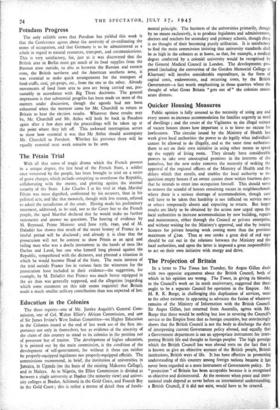Education in the Colonies
The three reports—one of Mr. Justice Asquith's General Com- mission, one of Col. Walter Elliot's African Commission, and one of Sir James Irvine's West Indian Committee—on Higher Education in the Colonies issued at the end of last week are of the first im- portance not only in themselves, but as evidence of the sincerity of the claim of this country to stand to its colonies in the position not of possessor but of trustee. The development of higher education, it is pointed out by the main commission, is the condition of the development of self-government, for without it there can neither be properly-equipped legislators nor properly-equipped officials. The commissions recommend, in brief, the institution of universities in Jamaica, in Uganda (on the basis of the existing Makerere College), and in Malaya. As to Nigeria, the Elliot Commission is divided as between a single university at Ibadan (the minority view) and univer- sity colleges at Ibadan, Achimota in the Gold Coast, and Fourah Bay in the Gold Coast ; this is rather a matter of detail than of funda- mental principle. The business of the universities primarily, though by no means exclusively, is to produce legislators and administrators, doctors and teachers for secondary and primary schools, though there is no thought of their becoming purely utilitarian. It is satisfactory to find the main commission insisting that university standards shall be as high in the colonies as at home, so that, for example, a medical degree conferred by a colonial university would be recognised by the General Medical Council in London. The developments pro- posed (including the conversion of the Gordon Memorial College at Khartum) will involve considerable expenditure, in the form of capital costs, endowments, and recurring costs, by the British Government—a fact worth emphasising in those quarters where the thought of what Great Britain "gets out of " the colonies causes acute distress.


























 Previous page
Previous page